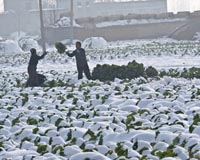 |
West Lafayette, Ind. (UPI) Dec 6, 2010 Farmers in the U.S. Midwest could get permanent Southern-style weather if future climate change projections are accurate, researchers say. Scientists at Purdue University say warmer average temperatures and precipitation extremes in the Corn Belt could force farmers to shift to more climate-appropriate crops or management strategies, a university release said Monday. Indiana's climate by the year 2100 could be like that of Virginia in the winter and Oklahoma in the summer, Purdue agricultural economist Otto Doering says. Winter temperatures in Virginia average in the mid- to upper 40s, and Oklahoma summer days regularly top 90 degrees. As the climate changes, farmers will be confronted with major meteorological challenges, Doering says. "Rainfall variability with a smaller number of storms over the growing season and more intense storms are things we'll have to watch out for," Doering says. "Then there's temperature. One area of concern is warmer winters," he says. "That might mean pests wouldn't be wiped out as much like on those days in January where it's below zero and the cold permeates the ground." A possible benefit from warmer annual temperatures is the prospect of more farmers growing soybeans and winter wheat in the same crop year. "Double cropping," as it is called, is practiced in Indiana mostly in southern counties because temperatures warm earlier in the spring and remain warm later into the fall. "I think we'll see more of the soybean-wheat double crop moving northward in Indiana, to the point where in 30 or 40 years we may see this kind of opportunity very viable for central Indiana," Doering said.
Share This Article With Planet Earth
Related Links Farming Today - Suppliers and Technology
 China leads decline in world rural poverty
China leads decline in world rural povertyRome (AFP) Dec 6, 2010 China has led a dramatic decline in rural poverty rates in many parts of the world over the past decade, a report released on Monday by the UN's International Fund for Agricultural Development showed. The decline is mainly due to increased production and higher levels of private investment in the farming sector, as well as increased urbanisation across the developing world, economists from t ... read more |
|
| The content herein, unless otherwise known to be public domain, are Copyright 1995-2010 - SpaceDaily. AFP and UPI Wire Stories are copyright Agence France-Presse and United Press International. ESA Portal Reports are copyright European Space Agency. All NASA sourced material is public domain. Additional copyrights may apply in whole or part to other bona fide parties. Advertising does not imply endorsement,agreement or approval of any opinions, statements or information provided by SpaceDaily on any Web page published or hosted by SpaceDaily. Privacy Statement |